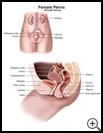
Infertility in Women: Brief Version
________________________________________________________________________
KEY POINTS
- Infertility is not being able to get pregnant after having sex without birth control for at least a year. It can be caused by problems in a man's or a woman's body.
- You may need to take hormone medicine or have surgery.
- All of this can be hard for you and your partner. It can help to get counseling.
________________________________________________________________________
What is infertility?
Infertility is not being able to get pregnant after having sex without birth control for at least a year. It can be caused by problems in a man's or a woman's body.
What is the cause of infertility in women?
Often the reason a woman cannot get pregnant is that no eggs come out of her ovaries. This can happen for many reasons. For example:
- You are 35 or older.
- You have a hormone problem.
- You are overweight or you have lost too much weight.
- You are under too much stress and worry.
- You have a tumor or cyst in your ovaries.
- You exercise too much.
- You use street drugs or tobacco, or drink too much alcohol.
- You have an illness, like diabetes or thyroid disease.
The uterus, or the tubes used by eggs to move to the uterus, may have been damaged. This could happen in many ways. For example, it may happen after an infection or surgery. Growths inside or outside the uterus or birth defects could also cause problems.
How can I find out what is wrong?
You and your partner will be examined by your healthcare provider. You will be asked about your sexual history and your medical history.
You may have tests, such as:
- Urine and blood tests
- Tests of fluid from your cervix
Your partner's sperm may be counted. He may not be making enough sperm.
Your healthcare provider may want to make sure that your uterus or tubes are not blocked. He or she may check for scar tissue in your pelvis with ultrasound, scopes, dyes, and X-rays.
Sometimes doctors cannot find out why a couple is having trouble getting pregnant.
How is it treated?
If your healthcare provider finds a problem that makes it hard for you to get pregnant, he or she will try to treat the problem.
- You may need to take hormones.
- You may need to take medicine to help your ovaries work.
- You may need to take medicine for an infection.
- You may need surgery.
- Sperm collected from your partner may be put in your body at the same time your egg leaves the ovary. This is called artificial insemination.
- Your egg and your partner's sperm can be put together in the lab. Then the growing egg can be put into your uterus. This is called in vitro fertilization.
Your partner may also need to be treated.
All of this can be hard for you and your partner. It can help to get counseling.
How can I help prevent infertility?
You can lower your chances of having these problems. Here are some of the things you can do to stay healthy:
- When not trying to get pregnant, use latex condoms when you have sex and have sex only with your partner. This helps prevent infections you can get from sex.
- Don’t use lubricants when you have sex.
- Don’t drink a lot of alcohol.
- Don’t use street drugs.
- Don’t smoke.

